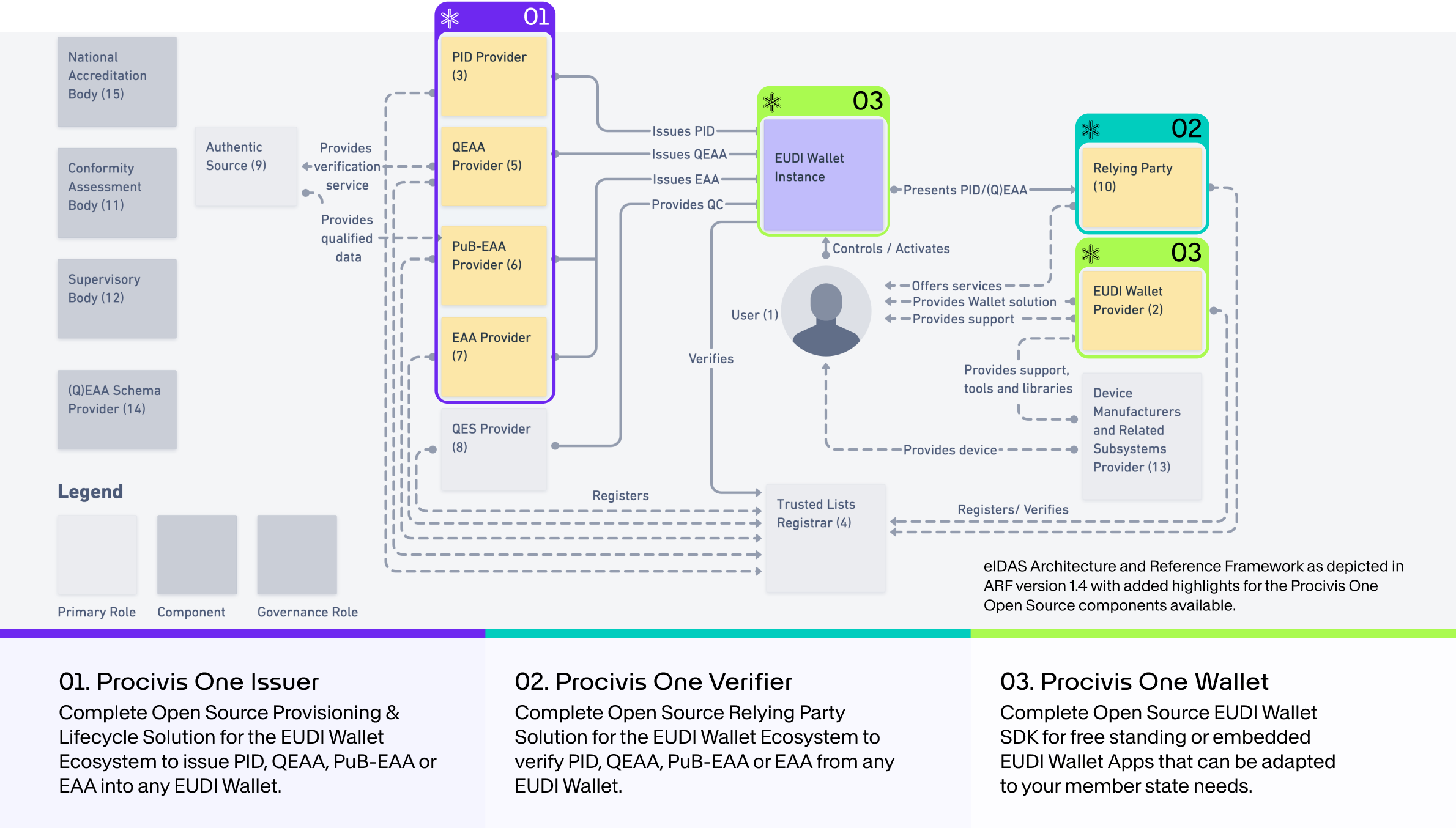
A React Native library for decentralized digital identities and credentials. Use it to hold or verify credentials via a multitude of technologies and protocols.
The SDK's SSI functionality is powered by the [Procivis One Core][core], a complete solution capable of powering every element of the digital identity credential lifecycle. See the key features and complete solution architecture.
- How to use the One Core SDK
- Getting started
- Background
- eIDAS 2.0
- Interoperability and conformance
- Supported standards
- Support
- License
- Use this SDK to embed wallet capabilities into an existing app
- Use the Procivis One Wallet for a free-standing solution that can be white-labeled
- Use the [One Core React Components][comp] library for UI elements for your digital wallet app
The fastest way to get started with the Procivis One Wallet is to download the app from the iOS or Android app stores and join our Trial Environment. In the trial environment, you are given control of an organization on our server solution, the Procivis One Desk, and can quickly begin issuing and verifying credentials.
See our documentation:
$ yarn add react-native-one-core
Add following to your app android/build.gradle:
...
allprojects {
repositories {
...
flatDir { dirs "$rootDir/../node_modules/react-native-one-core/android/libs" }
}
}
Add following to your app android/app/build.gradle to remove unsupported architectures:
...
android {
defaultConfig {
...
ndk {
abiFilters "armeabi-v7a", "arm64-v8a", "x86"
}
packagingOptions {
exclude 'lib/mips/**'
exclude 'lib/mips64/**'
exclude 'lib/armeabi/**'
exclude 'lib/x86_64/**'
}
}
}
import ONE from "react-native-one-core";
...
await ONE.getVersion();Decentralized digital identities and credentials is an approach to identity that relocates digital credentials from the possession and control of centralized authorities to the digital wallet of the credentials holder. This architecture eliminates the need for the user to "phone home" to use their credentials as well as the verifier to communicate to the issuer via back-channels, keeping the wallet holder's interactions private between only those parties directly involved in each interaction. This model of digital identity is often referred to as Self-Sovereign Identity, or SSI.
If you want to provide an EUDI Wallet, Procivis One provides production grade open source components to get certified and connect your organization to the eIDAS 2.0 ecosystem.
For an EUDI Wallet, use the One Core React Native SDK for embedding into an existing app, or use the Procivis One Wallet with adaptations to fit your needs.
If you want to issue into an EUDI Wallet or offer services to an EUDI Wallet holder, use the [Procivis One Core][core].
Procivis One is built using open standards and tested to ensure interoperability with different software vendors and across different international regulatory ecosystems.
- W3C standards
- The W3C offers several test suites for standards conformance. See the latest test results for Procivis One at canivc.com.
- ISO/IEC 18013-5 mDL
- Procivis One's implementation of the ISO mDL standard is compatible with the OpenWallet Foundation's verifier: Procivis One can successfully issue mDL credentials to a Procivis One Wallet, and these credentials can successfully be verified by the OpenWallet Foundation's verifier. See the OpenWallet Foundation libraries.
- eIDAS 2.0; EUDI Wallet
We continue to look for more opportunities for interoperability testing as the standards and regulations mature and harden.
- W3C Verifiable Credentials Data Model 2.0 in the following variations:
| Securing mechanism | Supported representations | Supported proof/signature types |
|---|---|---|
| W3C Data Integrity Proofs (embedded) | JSON-LD in Compacted Document Form | |
| W3C VC-JOSE-COSE (enveloping) |
* CRYSTALS-DILITHIUM is a post-quantum resistant signature scheme, selected by NIST for Post-Quantum Cryptography Standardization. Support for the recently published FIPS-204 is planned for the near future.
| Standard | Supported representations | Supported proof/signature types |
|---|---|---|
| IETF SD-JWT VC | SD-JWT |
* CRYSTALS-DILITHIUM is a post-quantum resistant signature scheme, selected by NIST for Post-Quantum Cryptography Standardization. Support for the recently published FIPS-204 is planned for the near future.
- OpenID for Verifiable Credentials
- OID4VCI; ID-1
- OID4VP; ID-2
- OID4VP over BLE; optimized version of Draft 00
- OID4VP over MQTT; proprietary adaptation of "OID4VP over BLE" via MQTT channel
- ISO/IEC 18013
- Secure Enclave (iOS) and Android Keystore (TEE or Strongbox)
- Internal encrypted database
- Bitstring Status List v1.0
- Linked Validity Verifiable Credentials (LVVC)
- Token Status List - Draft 03
Need support or have feedback? Contact us.
Some rights reserved. This library is published under the Apache License Version 2.0.

© Procivis AG, https://www.procivis.ch.
